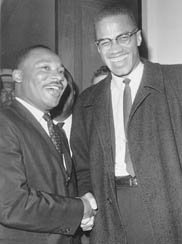
Injustice anywhere is a threat to justice everywhere. We are caught in an inescapable network of mutuality, tied in a single garment of destiny. Whatever affects one directly, affects all indirectly. Never again can we afford to live with the narrow, provincial “outside agitator” idea. Anyone who lives inside the United States can never be considered an outsider anywhere within its bounds.
—“Letter from Birmingham Jail”
Have you actually ever listened to the “I Have a Dream” speech–rather than just quoting the bits you know? It really is astonishing for its bravery and truth, and for the amount that it glows with God’s love and desire for justice.
Here’s the link to the video, but really? Download it and listen to it sometime when you have very little in the way of other kinds of stimulation going on–out taking a walk, maybe–so that you can actually let it penetrate you. Here’s an MP3.
I’ve chosen to post the picture of Rev. Dr. King with Malcolm X because I think that, towards the end of each of their lives, they had begun to find each other in their work, though we only have glimmers of what that might have looked like.
Brother Malcolm had been highly critical of the March on Washington (and King) when he was with the Nation of Islam, but eventually he underwent a profound transformation that changed how he understood the world, and race. On X’s hajj to Mecca, he began to see things as much less polarized than he once had. He wrote,
“Throngs of people, obviously Muslims from everywhere, bound on the pilgrimage, were hugging and embracing. They were of all complexions, the whole atmosphere was of warmth and friendliness. The feeling hit me that there really wasn’t any color problem here. The effect was as though I had just stepped out of prison.â€
This caused him to come forth with statements one might much more expect to hear from King, like: “I’m for truth, no matter who tells it. I’m for justice, no matter who it is for or against. I’m a human being first and foremost, and as such I’m for whoever and whatever benefits humanity as a whole.”
King, for his part, became increasingly radical over the course of time, speaking out increasingly against the Vietnam War and about the larger problems of the American economic system (I’ve heard that his trip to Sweden to receive the Nobel Peace Prize was a turning point–that being in a democratic socialist state gave him new ideas about what was necessary and what was possible for people economically). I’m under the impression that he began to make more people more uncomfortable as his messages got sharper and as he began to ask for more and more in the way of change.
I suspect that had they both lived, Dr. King and Brother Malcolm would have eventually found much common ground and, perhaps, become a combined force with which to reckon.
Sadly, we’ll never know. May both of their memories be for a blessing.
A few more words from Rev. Dr. King, from his Nobel acceptance speech:
I accept this award today with an abiding faith in America and an audacious faith in the future of mankind. I refuse to accept despair as the final response to the ambiguities of history. I refuse to accept the idea that the “isness” of man’s present nature makes him morally incapable of reaching up for the eternal “oughtness” that forever confronts him. I refuse to accept the idea that man is mere flotsom and jetsom in the river of life, unable to influence the unfolding events which surround him. I refuse to accept the view that mankind is so tragically bound to the starless midnight of racism and war that the bright daybreak of peace and brotherhood can never become a reality. I refuse to accept the cynical notion that nation after nation must spiral down a militaristic stairway into the hell of thermonuclear destruction. I believe that unarmed truth and unconditional love will have the final word in reality. This is why right temporarily defeated is stronger than evil triumphant.
